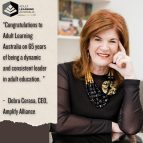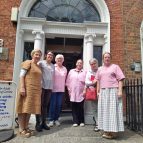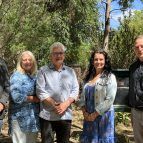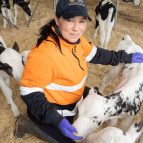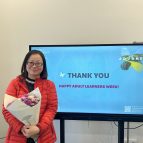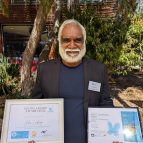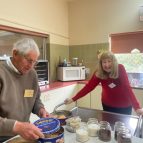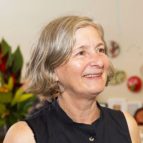U3A: 40 years of lifelong learning, connections and friendships
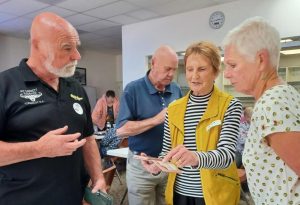 When the University of the Third Age (now known as U3A) started in 1984, it is unlikely that anyone was predicting that in its 40th year, there would be over 260 groups across Australia meeting the needs and interests of more than 100,000 members.
When the University of the Third Age (now known as U3A) started in 1984, it is unlikely that anyone was predicting that in its 40th year, there would be over 260 groups across Australia meeting the needs and interests of more than 100,000 members.
But that is what is happening now – every week, across the country, groups of older Australians are getting together in their local areas to learn, meet, create, listen and connect.
And all helping to achieve U3A’s vision to promote the benefits of positive ageing and lifelong learning to people’s mental and physical health and social engagement.
All U3A groups are volunteer run and managed locally with classes and activities based on needs and interests of the members of each group. News and information about different groups and networks is shared to members through a National quarterly bulletin and in turn a State Network and Local U3A communications initiatives.
Groups get together in community centres, libraries, neighbourhood houses and other local facilities, sometimes alongside men’s sheds and other community organisations. In Glen Wall’s local network, 760 members meet in 18 different venues.
A long-time U3A member – like most attendees are – Glen is currently Chair of U3A Australia, the movement’s umbrella organisation, and a member of the U3A Network Victoria Committee of Management.
Glen says that many people over the age of 50 come to U3A to continue their lifelong learning journey through classes which teach such topics as arts, craft, languages, genealogy, health and wellbeing, history and the like; while others come to learn new skills, including to keep technologically connected, or hobbies such as crafts and art.
There is also a very strong component, he says, that get health and wellbeing benefits through taking part in Tai Chi and other exercise activities – line dancing is always popular! And, equally as important to group convenors, is the provision of time for a coffee and chat at the end of sessions because so many people are also there for the social interaction and connection.
Some attendees have returned from retirement to paid work after gaining new skills, while others who had never picked up a paint brush before have found their work in art exhibitions.
With each group focused on providing activities which meet the needs of their own local older people, a lot of each group’s program is co-designed with participants.
Glen says that many groups find that the success of a class or group will lead to a new program.
U3A members – who are around 70% women and 30% men – pay an annual fee of around $60 per year, with occasional extra expenses such as when a bus is required to attend an event or activity. Glen says U3A’s volunteer model also works on encouraging about 10% of members to become tutors who are willing to share their experience and knowledge with their peers.
Glen took on such a role early on in his U3A journey and now teaches technology for seniors once a week. He is also working with RMIT University and research staff to develop a program where U3As could provide “technology cafes for seniors” designed to give members support to remain online and avoid the isolation which affects many older people who haven’t developed or kept up such skills.
This program would promote the benefits of people being able to take part in telehealth appointments and activities which keep them connected and engaging with others.
As with all community organisations, the COVID pandemic had significant impact on U3A, with a 10% drop in membership resulting. However, Glenn says, that this has been fully recovered in the years since. During lockdowns, most groups made the transition to Zoom so that they could assist in keeping people connected and participating in a range of classes and activities online.
“There was one group of 10 people who had all written material that they decided they wanted to self-publish, so an e-publishing class was set up to guide them through the process. Ultimately, two books were published so that was a great achievement for everyone involved” – Glen Wall
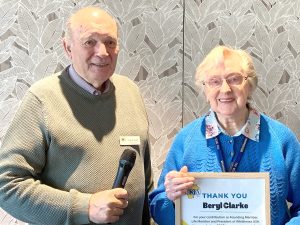
Lifelong learning and teaching make for colourful lives
Noelene Jardine and Beryl Clarke have both followed the U3A trajectory from class participant to tutor and now co-run Art for Fun classes, which usually attract about 20 people each session.
Beryl joined U3A when a new group was set up in 2002. Finding out about the program, she immediately decided “it was definitely for me”.
Having then recently retired as a nurse and nursing teacher, Beryl was initially involved in classes relating to desktop publishing and PowerPoint before rediscovering enthusiasm for art through the Art for Fun classes.
Today, at 92, she provides group members with monthly classes on watercolours and general painting principles. And she plans to keep being involved “for as long as I possibly can”.
She and Noelene complement each other beautifully, with Noelene providing participants with the benefit of her expertise working with acrylic paints.
“We ask the students what they would like to learn about – at the moment it is how to paint feathers – and then usually Beryl will do a class about watercolour painting of feathers and then at another class, I will show them with acrylics,” said Noelene.
And while the emphasis of the classes is fun, group members often enter works in local art exhibitions and shows, with many of these works being sold. Last year, group members entered 13 paintings in the Whittlesea Agricultural Show and won eight awards!
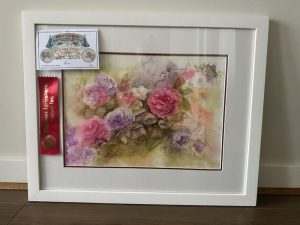
Noelene, who initially joined U3A as a way to meet and connect with people after moving back from a long stint living in Sydney, says that “people have to get out of their houses and communicate with other people”.
People who love art, she says, get the additional benefits of inspiration and encouragement from other group members. “Most people also find art quite therapeutic. You can get into the zone and find it quite relaxing”.
When teaching nursing, a psychologist colleague told Beryl about the SPICE of life activity model. Sometimes modified by different groups, Beryl says she takes this acronym as encompassing the social, physical, intellectual, cultural and environment activity you need in your life, particularly at an older age.
“Everything I do, including with the classes, is based about making sure you have this spice of life approach. You can vegetate so easily, but if you don’t do that, you get so much more from life.”
https://u3aaustralia.org.au/

